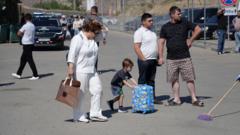In the searing heat of the Agarak border crossing, surrounded by barren mountains, a scene unfolds showcasing the desperate measures families are taking. Amid the dust and harsh landscape, several Iranians, including a woman with a stylish haircut cradling her baby, find solace at the border while negotiating rides into Armenia. Among them are families who held dual citizenship or residency elsewhere, indicating a broader trend of fleeing.
The ongoing conflict, now spanning over a week, began with Israeli strikes on military and nuclear facilities in Iran, resulting in significant civilian casualties. According to the Human Rights Activists News Agency, the toll has surpassed 657 deaths, with Iran retaliating through missile strikes killing at least 24 individuals. As Israeli forces declare air superiority, residents of Tehran are increasingly feeling the impact of the violence, with reports indicating they have been awakened by the sound of bombings throughout the night.
One Iranian father from Tabriz expressed, "Today I saw one site where the bombing happened. All the people are scared, every place is dangerous." His remarks echo the sentiments of many fleeing from the escalating attacks. Streets in Tehran have become congested as citizens attempt to escape the chaos, with journeys to Armenia taking over 12 hours.
Youth returning to their homes abroad share harrowing experiences, as one Afghan man lamented the poor situation in Tehran, describing it as "very bad," characterized by sleepless nights due to continuous explosions. An Australian resident, who had been vacationing in Iran, reported, "Someone comes and attacks your country, would you feel normal?" highlighting a common mindset among those affected.
While some individuals express steadfastness in their ties to Iran, claiming they feel safe and are unwilling to leave their homeland, a contrasting narrative exists among those seeking refuge. "If I am supposed to die, I will die in my country," stated Ali Ansaye, back from a holiday in Armenia, reflecting a sense of loyalty amidst the turmoil.
The delicate geopolitical landscape adds an unsettling dimension to the flow of refugees, with fears of possible regime change in Iran sparking debate among Israeli officials. However, many Iranians remain resilient, asserting their country's stance against perceived aggressions.
Meanwhile, the crossing continues to witness a mix of hopeful and distressed faces searching for a path safer than the one they are leaving behind, as the threat of conflict looms larger.
The ongoing conflict, now spanning over a week, began with Israeli strikes on military and nuclear facilities in Iran, resulting in significant civilian casualties. According to the Human Rights Activists News Agency, the toll has surpassed 657 deaths, with Iran retaliating through missile strikes killing at least 24 individuals. As Israeli forces declare air superiority, residents of Tehran are increasingly feeling the impact of the violence, with reports indicating they have been awakened by the sound of bombings throughout the night.
One Iranian father from Tabriz expressed, "Today I saw one site where the bombing happened. All the people are scared, every place is dangerous." His remarks echo the sentiments of many fleeing from the escalating attacks. Streets in Tehran have become congested as citizens attempt to escape the chaos, with journeys to Armenia taking over 12 hours.
Youth returning to their homes abroad share harrowing experiences, as one Afghan man lamented the poor situation in Tehran, describing it as "very bad," characterized by sleepless nights due to continuous explosions. An Australian resident, who had been vacationing in Iran, reported, "Someone comes and attacks your country, would you feel normal?" highlighting a common mindset among those affected.
While some individuals express steadfastness in their ties to Iran, claiming they feel safe and are unwilling to leave their homeland, a contrasting narrative exists among those seeking refuge. "If I am supposed to die, I will die in my country," stated Ali Ansaye, back from a holiday in Armenia, reflecting a sense of loyalty amidst the turmoil.
The delicate geopolitical landscape adds an unsettling dimension to the flow of refugees, with fears of possible regime change in Iran sparking debate among Israeli officials. However, many Iranians remain resilient, asserting their country's stance against perceived aggressions.
Meanwhile, the crossing continues to witness a mix of hopeful and distressed faces searching for a path safer than the one they are leaving behind, as the threat of conflict looms larger.

















